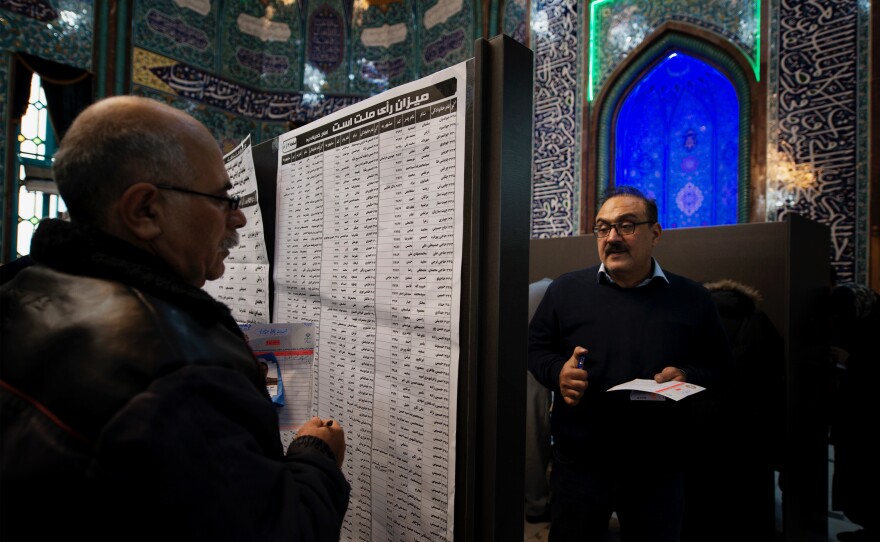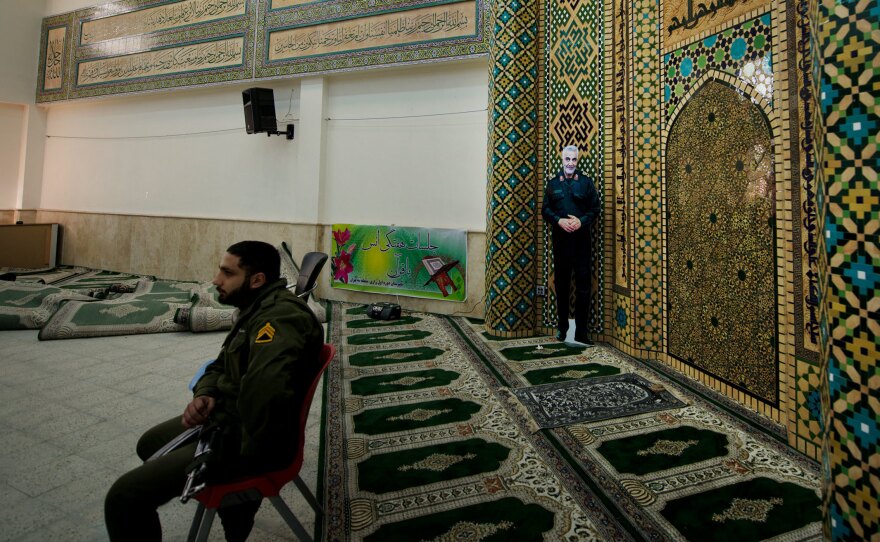Iran is holding national elections Friday, as voters choose members of parliament from a list of candidates winnowed down to feature hardliners and conservatives. Midterm elections are also being held for the Assembly of Experts, the clerics who have the power to select the country's supreme leader.
More than 15,000 would-be candidates had sought to win a four-year term in parliament, officially called the Islamic Consultative Assembly, or Majlis. But the powerful Guardian Council, which vets all candidates, has disqualified thousands of people from running. Many of those who were culled were reformist or moderate candidates. Dozens of them are current members of parliament who are now barred from seeking reelection.
That left more than 7,000 candidates standing for election to Iran's 290-seat parliament.
"This weeding out on ideological terms is quite frustrating for Iranian voters here in the capital, especially," NPR's Peter Kenyon reports from Tehran. "They've long wanted parliament to follow more moderate policies, both at home and abroad."

Kenyon spoke to young Iranians who said they don't plan to vote because they don't believe the candidates would do anything to improve the lives of regular people.
"Unfortunately not," a 25-year-old man named Qassem told Kenyon outside a café. "Because I don't see any future in these elections. So because of that, I won't go."
In previous parliamentary elections, Iran's Guardian Council has rejected between 15% and 50% of the candidates who registered, Iran's government-backed Press TV reports. But it adds that "this year's purge is probably the biggest since the Islamic Revolution in 1979."
Iran's reformers want the country to have a more open society and allow its citizens to have more freedom of expression — and even dissent, Kenyon says.
"Instead, as we saw in November, there was a violent crackdown against demonstrators who were protesting sharp price hikes in essential goods," he adds.
Moderates and hardliners are also divided over the role Iran should play in the Persian Gulf, and what kind of relationship it should have with archrival Saudi Arabia, Kenyon says.
The candidates who were approved to run in Friday's election had just one week to make their case to the public. Under Iran's election system, candidates have seven days to campaign. That period ended early Thursday; the country then entered a 24-hour quiet period before polling stations opened Friday morning.
The vote is being watched closely for any insights into how Iranians view their country's future and whether they want the government to take a more hard-line stance against the U.S. The outcome, and especially voter turnout, also could signal what Iran's presidential election next year will look like.

Even after the election, the legislature will remain under the broader government's control. As the Islamic Republic News Agency says: "The Majlis has no legal status without the Guardian Council. Any bill passed by the Majlis must be reviewed and approved by the Guardian Council to become law."
The election is taking place less than two months after the U.S. carried out the targeted drone killing of Iranian military commander Maj. Gen. Qassem Soleimani. It's also Iran's biggest election since President Trump abandoned an international nuclear deal with Tehran and renewed U.S. economic sanctions on Iran.
Iran's supreme leader, Ayatollah Ali Khamenei, urged people to exercise their right to vote Friday, calling election day a national holiday and saying, "Moreover, voting is a religious duty."
Copyright 2023 NPR. To see more, visit https://www.npr.org. 9(MDAzMjM2NDYzMDEyMzc1Njk5NjAxNzY3OQ001))






